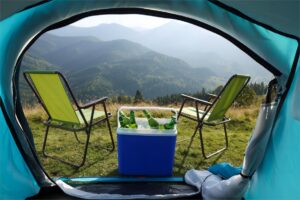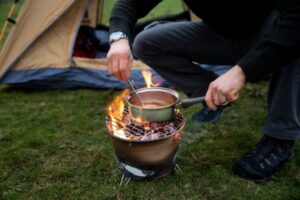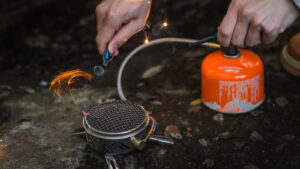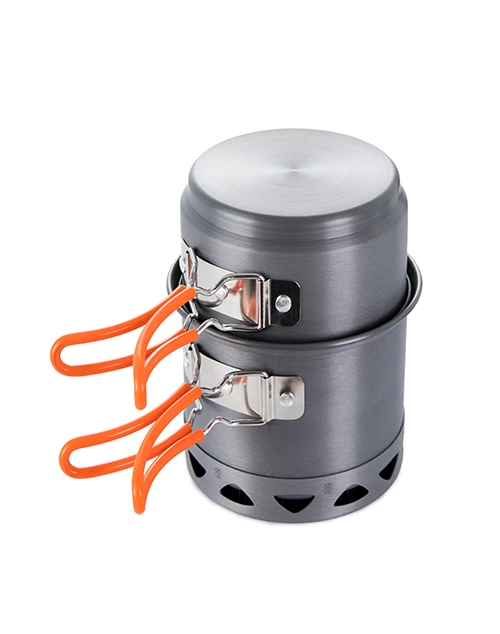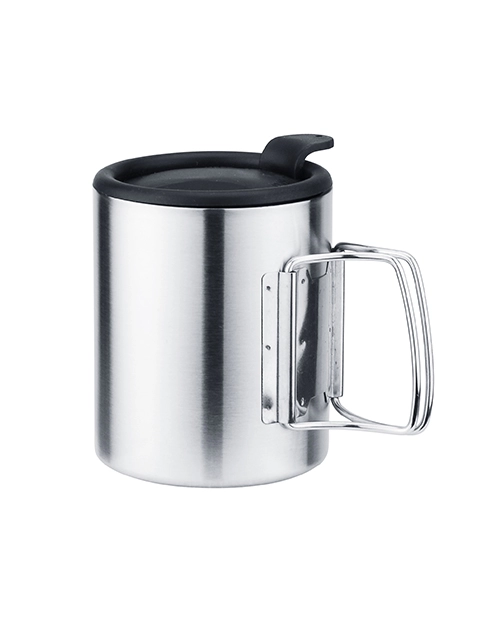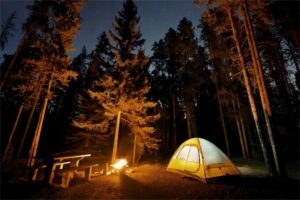
Yes, it is safe, but you must make the necessary preparations and know what to do in any difficult circumstance. Let me explain the benefits of camping in a tent, and at the conclusion of this post, you will know exactly what to do and what not do.
What are the most significant hazards associated with camping trips?
Fire hazards
A great campfire may be magical, but it can also quickly turn dangerous. It is critical to correctly construct your fire to keep it from spreading and burning out of control – not just for your safety, but also for the protection of the forest. Remember that only you can prevent forest fires. In addition to taking precautions to avoid spreading fire, keep your fire a safe distance from your tent. Although most tents are made of flame-retardant material, this does not imply they are indestructible.
Safety Tip: Keep flammables, particularly dry papers, and liquids, away from the fire, and where feasible, use pebbles to create a non-flammable barrier around it.
Bears
Yogi and Boo might look sweet and cuddly, but they are not to be underestimated. Bears live in many popular camping spots. Be cautious with food storage (do not leave your leftovers out!) and attempt to reduce any food or hygiene product odors that may attract bears by only using such things at camp when essential. If you see a bear, don’t worry; just keep your distance and don’t approach it. Mother bears are fiercely protective of their cubs and may often attack if they feel endangered.
Safety Tip: When hiking or camping in areas with bear activity, make a lot of noise to warn the animals to your presence; chances are, if they hear you, they will stay away. When you’ve settled up for the night, put your food and hygiene supplies in a bear canister or hang them in a tree at least 100 feet away from camp.
Dangerous weather
Weather is unpredictable and might surprise you no matter how often you check the forecast. Lightning is a typical threat to be cautious of; however, it is not the only one. Make sure you have a strategy in place in case of flooding, as well as excessive temperatures. Research the weather in the location you’re going to, at all times of day, and be prepared for any situation. Hypothermia, for example, is not limited to the winter months. Cold summer nights, severe downpours, and even hot walks can all contribute to this deadly condition.
Safety Tip: During the rainy season, set your camp away from moving water and avoid low-lying locations to avoid severe flash flooding. If you get caught in the rain, fall in a body of water, or sweat profusely, dry yourself immediately and change your damp garments with dry ones. Get yourself to a warm spot and wrap up in blankets as quickly as possible. During lightning storms, avoid standing near lone trees and instead seek shelter in a valley in the terrain or a clump of tiny trees encircled by bigger ones. In open areas, go low and avoid touch with the earth.
When coping with excessive heat, it is critical to keep hydrated. Drink at least one liter of water per hour.
Plants and berries
Unless you’ve had extensive training in recognizing wild berries, your best chance is to simply avoid them. Although many are harmless, some are not suitable for human ingestion and may cause serious sickness. The same is true for the various wild plants you’ll come across; some may poison you if ingested, while others can severely irritate your skin if touched.
Safety Tip: Keep things simple: If you can’t identify anything with 100% certainty, don’t consume or touch it.
Insects
This is probably the most prevalent and actual threat on our list, especially because ticks and mosquitos have been known to transmit diseases like malaria and Lyme disease. Though insects are difficult to avoid—they’re one of those unavoidable evils when spending time outside—there are steps you can do to reduce the danger.
Safety Tip: Use insect repellent with DEET or picaridin and reapply frequently, especially if you’re sweating or in the water. Before you go to bed, check yourself for ticks. If you discover one burrowed into your skin, remove it right away (these advice from the Center for Disease Control might assist) and contact your doctor as soon as possible.
Tips for minimizing risks when camping
Risk cannot be totally eliminated; it is an inherent aspect of being alive. However, this does not exclude you from taking steps to minimize the risk.
Whether you’re in a National Park campsite or backpacking through a lonely mountain range, here are some general recommendations to help you stay safe.
- Always be prepared
- Stay aware of your surroundings
- Store your food properly
Always prepare
If this is your first trip in a certain location, do some study ahead. Check out the webpage for the specific forest, park, campsite, etc. If possible, speak with someone who has been there previously to obtain any information that you may be unaware of.
Are bears often observed in the area? Are there bear-proof lockers for storing food? Does the nearby river frequently flood? Is there a camp store or gear shop nearby? These are some of the questions you should know before going camping or hiking. As you get more experience, you’ll figure out what stuff you’ll need. Whether I was hiking or just vehicle camping, I frequently brought more than I needed. It’s less important with vehicle camping (the car is right there), but you’ll be happy if you don’t have to load and unload a carload of things you didn’t need.
Aware of your surroundings
If you notice dark clouds rolling in over the mountains, ensure your tent’s rainfly is firmly fastened and secured. If you’re grilling burgers over the fire pit, be sure no hungry bear comes up behind you. You will surely be surprised, believe me. When you’re finished using the fire pit, make sure it’s completely extinguished before leaving the campground or going to bed. Almost any animal or human hazard may be avoided if you are aware of your surroundings and well prepared.
Store food properly
One of the most important aspects of safe tent camping is appropriate food storage. You don’t want to wake up to a bear knocking about your cooler and ransacking your food. But there is always someone at a campground who doesn’t take this seriously. This is one of the main reasons why wild animals continue to return to campgrounds.
Conclusion
Camping in a tent is really safe. There are hazards involved (whether in a campsite or in the bush), but it is very rare for something horrible to happen. Even when nothing unpleasant is likely to happen, you should do everything you can to reduce the risk.
The three best things you can do are:
- Be prepared
- Aware of your surroundings
- Store your food properly
If you do these three things, you will reduce the likelihood of something going wrong. Make your next camping trip the best it can be!
ODM service
Looking for reliable wholesale outdoor equipment? At Deermaple, we specialize in ODM service, offering high-quality and innovative cooking gear tailored to your needs.
If you are interested in outdoor gear wholesale, please contact us.


